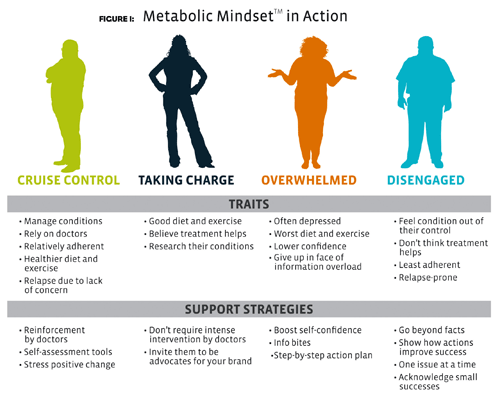It’s time for a change—in behavior as well as marketing. Marketers can build lasting brand loyalty by offering patients the support they need to change their behavior and achieve better health.
Patients today are dominant stakeholders in their own healthcare decisions. Understandably, they are less concerned with product health than with their own. Pharmaceutical marketers who want to build brand loyalty must make a real commitment to improving health outcomes. Accomplishing that goal, however, means helping the patient to make important changes in behavior.
Unfortunately, most patient support programs are product-centric. They focus on brand awareness but ignore the obstacles that patients face in making day-to-day decisions. To reach consumers before those decisions are made, marketers need to learn what motivates their patients— psychologically and emotionally— and what stops them from making the changes that will lead to success.
When patients feel empowered to make lifestyle changes—such as eating less or not smoking—everyone wins. Patients and healthcare providers benefit from the patient’s compliance and subsequent improved health. The brand wins by differentiating itself from the competition, simultaneously boosting the product’s image and improving patient outcomes.
Understanding basic psychological needs is what behavioral science is all about. It explains why people act the way they do and provides a glimpse into the factors that motivate or deter them when they are given medical advice. Identifying those factors is the first step toward changing patient behavior patterns.
METABOLIC MINDSET: A ROADMAP TO CHANGE
To bring these behavioral patterns to life, MicroMass recently conducted a research study to uncover the key motivational drivers of patients with diabetes, hypertension, high cholesterol, and obesity. These conditions, which are all related, account for an estimated 25% of all healthcare costs and contribute to the looming “metabolic epidemic” in America.
All patients—regardless of their condition—fell into one of four distinct profiles, each offering different strategies for altering the behavior of those in that group. We call this the Metabolic Mindset in Action.

TAKING CHARGE, CRUISING, OVERWHELMED, DISENGAGED
Patients identified as Taking Charge have many positive traits. They actively engage in their treatment, but they are more likely to switch brands. Marketers who hope to hold on to these patients must provide them with more than the nutritional basics. These patients welcome ideas for exotic yet healthy meals, new methods for fat-free cooking, and tips on offbeat ingredients. Because they like recognition, these patients should be invited to share their stories or become part of an advisory council. In that way, they become patient ambassadors—and potentially powerful brand advocates.
Patients on Cruise Control are somewhat adherent, but are prone to relapse because of their lack of concern over the seriousness of their disease. Changing the behavior of this group requires strong positive reinforcement, repeated frequently. These patients need self-assessment tools that demonstrate the benefits of healthy behavior and allow them to see the progress they have made. The Overwhelmed want to change, but don’t know how to start. For this group, the best strategy is to help them raise their self-confidence by setting small goals. Marketers should dole out information in digestible bites and create action plans that are easy to monitor. These patients need constant positive reinforcement. They often gravitate toward commercial weight-loss plans and welcome fast-food options as well as devices—such as iPhone apps—that track calories and nutritional content on the run.
The most difficult patients are the Disengaged. These are the chronic sufferers who feel that improvement is beyond their control. Marketers should allow these patients to work on one issue at a time and acknowledge each small success. For example, instead of telling them to do everything at once—lower their salt intake, cut out fried food, and cut down on fat—focus on one step, and involve family and friends in the program.

PROOF POSITIVE
Behavior unquestionably plays a major role among those who suffer from chronic disease. The numbers tell the story. According to the Centers for Disease Control and Prevention (CDC), behavior outweighs all other factors in determining a person’s level of health—40%, compared with the environment (5%), healthcare practices (10%), socio-economics (15%), and even genetics (30%).
TREATING BEHAVIOR WORKS BETTER THAN TREATING CONDITIONS
It’s easy to understand why patients fail. Change is hard. In another study—this one involving a representative sample of more than 800 women with Type 1 and 2 Diabetes— we identified a huge “confidence gap” among those questioned. While 84% of the patients were “very confident” that they could manage their medications, only 20-30% felt that they could keep their weight under control. (See Figure 2.) The lack of confidence regarding weight was likely to undermine the effectiveness of their medications.
OVERCOMING INSTITUTIONAL INERTIA TO IMPROVE BRAND HEALTH
In the past, marketers often believed that brand promotion and patient support were incompatible. Yet nothing could be further from the truth. In today’s climate, an effective patient support program can be exactly what the marketer needs to break through the clutter of competing brands. Patients are more likely to stick with a prescribed medication if they have the support they need in order to see progress. Better outcomes inevitably lead to satisfied patients. And satisfied patients will spread the word, leading to more referrals. Physicians, who do not have the time to provide lifestyle coaching, are more likely to prescribe brands that provide this support.
Pharmaceutical marketers today have a chance to be seen as more than pill pushers. While other players in the industry may be under attack, pharmaceutical companies can be seen as filling a void by helping patients to discontinue harmful behaviors. The gates are wide open for companies that are willing to set new standards. It is up to the marketers to walk onto the field and change the rules of the game.
BRANDING AND PATIENT SUPPORT
A number of brands have begun sponsoring patient education programs that use behaviorally targeted messages to improve healthcare outcomes. Here are two examples of the effectiveness of that approach.
SMOKING
The Committed Quitters program, sponsored by smoking cessation products Nicorette and Nicoderm, used behavioral science to craft messages aimed at lowering specific barriers, such as eating habits, social bonding, and stress relief. The brand also targeted three groups: smokers who were thinking of quitting, those who were in the process of quitting, and those who had already quit and were trying to avoid relapse. Tools to motivate each were distributed along with medication. An independent study found that patients enrolled in the program were 56% more likely to quit smoking than those who used medication alone.
HYPERTENSION
Another brand-sponsored program—for a blood pressure medication—focused on what behavioral scientists call locus of control. Here the strategy was to target the patients’ perception of how much they could control their own medical problems. Patients with a strong sense of control received extensive information at the beginning of treatment. Those who felt overwhelmed or believed that their condition was beyond their control were given tidbits of information, spread out over time. Among patients who participated, 65% lost weight and started a regular exercise routine, while more than eight out of ten monitored their condition more frequently. As a result of the program, physicians wrote more prescriptions for the product and patients, on average, extended the length of their therapy by 32 days. The bottom line was an increase in ROI and confirmation that better health for the patient is better health for the brand.






